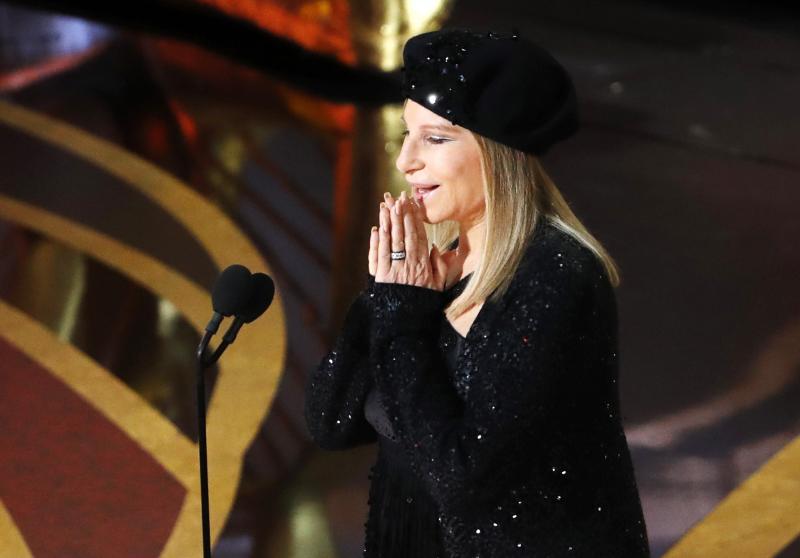In a tweet on April 5, legendary singer and actress Barbra Streisand praised Taiwan for its handling of the COVID-19 outbreak. “Taiwan, despite being just 100 miles from mainland China with regular flights to and from Wuhan, has successfully staved off the worst of the coronavirus pandemic,” the superstar tweeted.
She pointed out that Taiwan had only five deaths at the time, and that most schools and businesses remained open. Later that day, President Tsai Ing-wen retweeted Streisand’s post, saying that it is encouraging to have one of the world’s most distinctive voices speak up in support of Taiwan’s proactive approach against the outbreak.
“We are more than willing to share our experiences with friends around the world as well,” the president wrote, followed by hashtag #TaiwanCanHelp — a slogan signifying Taiwan’s willingness to contribute to the world during the pandemic. Fans have suggested that Streisand stage a concert in Taiwan after the crisis, so she can see this beautiful land in person.

Photo: Reuters
照片︰路透
(Eddy Chang, Taipei Times)
在四月五日的推特中,傳奇歌手、演員芭芭拉史翠珊大讚台灣對於武漢肺炎的爆發處理得宜。這位超級巨星推文說:「儘管台灣距離中國大陸僅約一百英里,與武漢間還有例行往返的班機,但已成功擊退新冠病毒流行病最嚴峻的挑戰。」
她指出台灣至當天為止只有五例病死,大多數學校與商家仍正常運作。蔡英文總統隨後在當天亦轉推這則推文並說,世界上最特別的聲音,能發聲力挺台灣主動對抗疫情的方法,這真是令人大受鼓舞。
蔡總統並說:「台灣很樂意與世界各地的朋友分享我們的經驗。」在文末並附上「台灣能夠幫忙」(#TaiwanCanHelp)的標籤——藉此口號表示台灣願為全球防疫盡一己之力。還有歌迷建議史翠珊在疫情平息後來台開唱,親自看看這片美麗的土地。
(台北時報張聖恩)

A: Google has unveiled its 2025 Year in Search chart. No. 10 to No. 6 are: Typhoon Podul, Chinese drama “Love’s Ambition,” tariffs, US President Donald Trump and singer Khalil Fong’s death. B: Wow, actress Rosy Zhao’s new drama is so popular. So what are the top five? A: No. 5 to No. 1 are: Gemini, hanzii.net, NT$10,000 cash handout, entertainer Big S’ death and earthquakes. B: Hasn’t Trump topped this year’s most-searched people chart? A: Yup, and he’s closely followed by cheerleader GuoGuo Chiang at No. 2, whose husband Zack Fanchiang is also at No. 8. Apparently, people are curious about her extramarital

In June, headlines shocked the art world when a visitor damaged a 17th-century painting at the Uffizi Galleries in Florence, Italy, while posing for a photograph. This was not an isolated event. Recently, similar disasters have been reported worldwide, from a child damaging a Mark Rothko painting to a tourist breaking an exhibit by pretending to sit on it. Such incidents highlight why museum etiquette is increasingly crucial. First, we must recognize that art and historical objects are fragile. Once damaged, they may never regain their original condition. Many common actions, though harmless at first glance, can have grave consequences. For

A: Compared to Taiwanese, what did Americans search for most in 2025? B: No. 10 to No. 6 are: Tariffs, FIFA Club World Cup, government shutdown, DeepSeek and incoming New York mayor Zohran Mamdani. A: Mamdani is set to take office on Jan. 1. And what are the top five? B: No. 5 to No. 1 are: the One Big Beautiful Bill Act, iPhone 17, Labubu doll, animated blockbuster KPop Demon Hunters and political activist Charlie Kirk’s assasination. A: The only term to appear on both the Taiwanese and US charts is tariffs. A: 跟台灣人相比,美國人都在搜尋什麼? B: 第10到6名是:關稅、FIFA俱樂部世界盃、政府關閉、DeepSeek語言模型、候任紐約市長佐蘭曼達尼。 A: 曼達尼元旦即將就任,前5名是什麼? B: 第5到1名是:《大而美法案》、iPhone 17、拉布布玩偶、動畫片《KPop獵魔女團》、政治活動家查理柯克遇刺。 A: 看來台、美熱搜榜唯一的共同議題就是--關稅! (By Eddy Chang, Taipei

The world is teeming with danger and unpredictability. To safeguard themselves from harm and invite good fortune, people across cultures carry or display symbolic charms and trinkets. It is common to see beckoning cat figurines in stores in Japan, while people in China have historically kept crickets in cages for good luck. Even flora can serve as emblems of luck, with the four-leaf clover standing out as perhaps the most iconic. A clover is a small plant that typically grows 10 to 30 cms in height. While there are many species of clover, the variety that people consider to